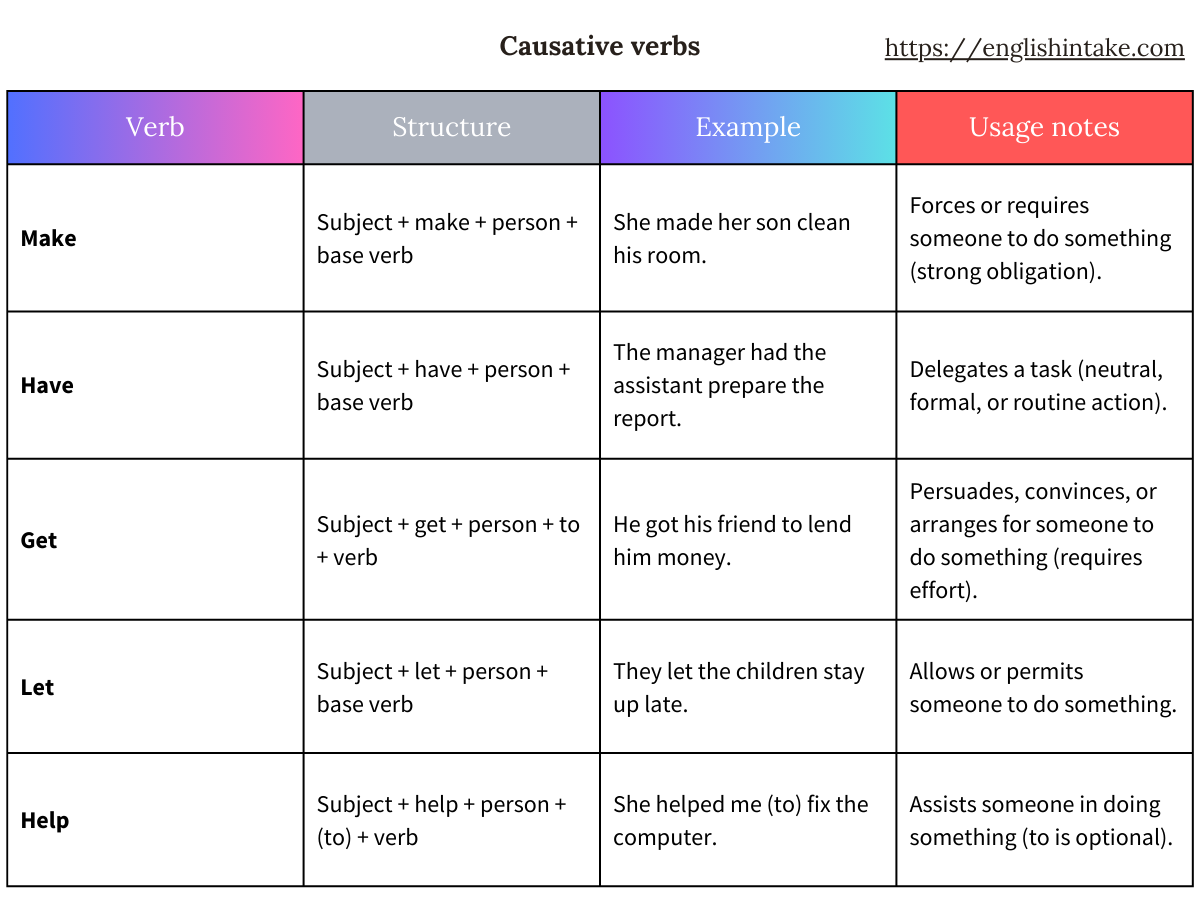1. What are causative verbs?
Causative verbs indicate that someone or something causes another person to do something. They help us express actions indirectly. In this lesson, we will look at their forms, structures, and examples.
2. Examples
The most common causative verbs are have, make, let, and get. So what makes them causative? Let’s look at them one by one. Note that the following list is not exhaustive.
HaveWhen you use "have" causatively, you’re asking or arranging for someone else to do something for you.
I had the mechanic fix my car. Here, the mechanic performs the action of fixing the car because the speaker arranged for them to do it. For additional examples and practice, try our exercise on the correct use of the have something done structure in English.
MakeUsed when someone is forced or compelled to do something. It involves some level of authority or force, whether physical, moral, or social.
The teacher made the students stay after class. The teacher caused the students to stay by giving them no choice or forcing them to do so.
LetUsed when permission is given to someone to do something. It indicates that the subject allows someone else to take action.
She let me borrow her book. In this example, the subject (she) allows the object (me) to borrow the book.
GetUsed to persuade, convince, or arrange for someone to do something.
I got him to help me with my homework. Here, the speaker persuaded or convinced him to help with homework.
3. Uses in interrogative sentences
Causative verbs can also be used in interrogative sentences. The usual structure is: [Question word] + [Causative verb] + [Subject] + [Object] + [Base verb/infinitive/past participle]?
1. Will they get the documents signed by Friday?
2. Where did you get the car repaired?
3. Why did she make him leave the party early?
4. Have you had your house painted yet?
5. Can you have your car washed tomorrow?
6. Should I allow her to use my car?
8. How often do you have your teeth checked?
To form negative questions, simply add the negation "not" after the auxiliary verb. The structure remains the same as for affirmative questions.
1. Didn’t you have your house painted?
2. Why didn’t you make him clean the room before he left?
3. Why don’t they allow us to go inside?
4. Haven’t you had your ears checked lately?
5. Shouldn’t the police have him released?
6. Can’t you have your car fixed this morning?
4. Frequently used verbs with a causative meaning
There are many causative verbs in English. The list below illustrates some of the most common ones.
haveI had my car washed yesterday.
makeShe made him apologise for his behaviour.
letHis mother let him stay out late.
getI got him to help me with my homework.
helpShe helped me finish the project.
askI asked him to lend me his book.
forceHe forced them to leave the party early.
allowThey allowed me to enter the room.
tellShe told him to be quiet.
orderThe teacher ordered the students to sit down.
warnHe warned her not to go outside in the storm.
teachMy father taught me how to drive.
causeThe storm caused the river to flood.
inviteShe invited me to attend her wedding.
get someone toHe got me to help him with his project.
help someone toShe helped me to carry the groceries.
encourageHis friends encouraged him to pursue his dreams.
requireThe job requires you to have a degree.
persuadeShe persuaded him to join the team.
convinceThey convinced me to buy the new phone.
compelThe law compels them to report the incident.
enableThe new software enables me to work from home.
force someone toThe police forced the crowd to disperse.
coerceThe criminal coerced the victim into giving him money.
pressuriseShe pressurised him into taking the job offer.
5. Common uses
Causative verbs are particularly useful when you want to focus on the person who causes the action rather than the person who performs the action.
1. When you want to tell someone to do something for you.
2. When you need to describe a situation where someone else is performing the action on your behalf.
3. When you want to express permission or force in a situation.
6. Summary
In English, causative verbs express that someone causes or arranges for an action to happen. The table below illustrates their structures and uses in sentences.
| Structure | Causative verbs | Example |
|---|---|---|
| Subject + Causative verb + Object + Verb (base form) | let, make, help, have | She made him work. |
| Subject + Causative verb + Object + Infinitive (to + verb) | require, permit, allow, force, cause, get | He forced her to study. |
| Subject + Causative Verb + Object + Past participle | have, get (for actions done for the subject) | I had the car washed. |
7. Learning material

